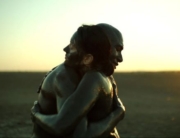It’s possible there is someone somewhere who is unaware of the lengths to which man will go for a cash prize. Or there may be a teenager, raised in a media-free cave, ignorant of the power of greed. Such prospective viewers would likely be darkly amused and horrified by the goings on in Cheap Thrills. The rest of the world can manage this low-budget flick with a few chuckles and yawns.
David Koechner, Champ from Anchorman, plays Colin, an exceedingly rich man looking for a special birthday present for his much younger wife (Sara Paxton). He finds it in Craig and Vince, high school pals reuniting at a bar. Not much time is spent establishing the relative rockiness of the bottom that these average Joes have landed in. Craig (Pat Healy), an unsuccessful writer, has been laid off from his auto mechanic job, while Vince (Ethan Embry) is a (seemingly busy) money collector. Able-bodied and articulate, they don’t exactly look like men pushed to the end of society’s line, but they’re about to act that way.
Probably the state of our current economy is supposed to add credibility to the ease with which these two become money-grubbing maniacs, unless the idea is that anyone anywhere is just a nudge away from sociopathy. Along that line, Stanley Milgram’s famous psychological experiment is brought to mind. Milgram’s subjects found themselves willing to administer lethal electric shocks to friendly strangers simply because they were ordered to do so. But that experiment featured a more ingenious design and results far more chilling than this would-be shockfest.
The plot is so simple and the dialogue so thin that a healthy helping of undramatic pauses stretches this story to feature length. Colin leads the men through a series of shameful and sadistic trials. It’s like “a reality game show,” he says, as if the parallels aren’t obvious enough.
The make-up and other effects used to depict these labors are solid enough to elicit a few groans, but the writing is too transparent to ever manage any real tension. Proponents of the Chekhov’s gun principle—or, well, most anyone—will see the end coming from a ways off.
That the actors are convincing in their portrayals of this quarter of losers feels as much an insult as a compliment. At least they have the distinction, like Craig and Vince, of having been paid for this stunt.






Leave A Comment